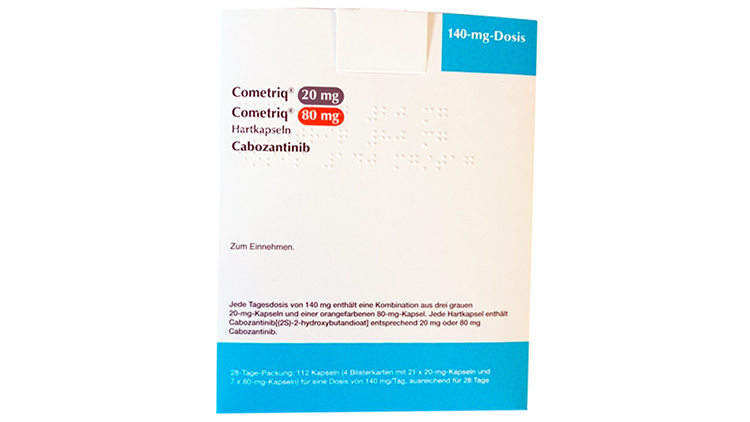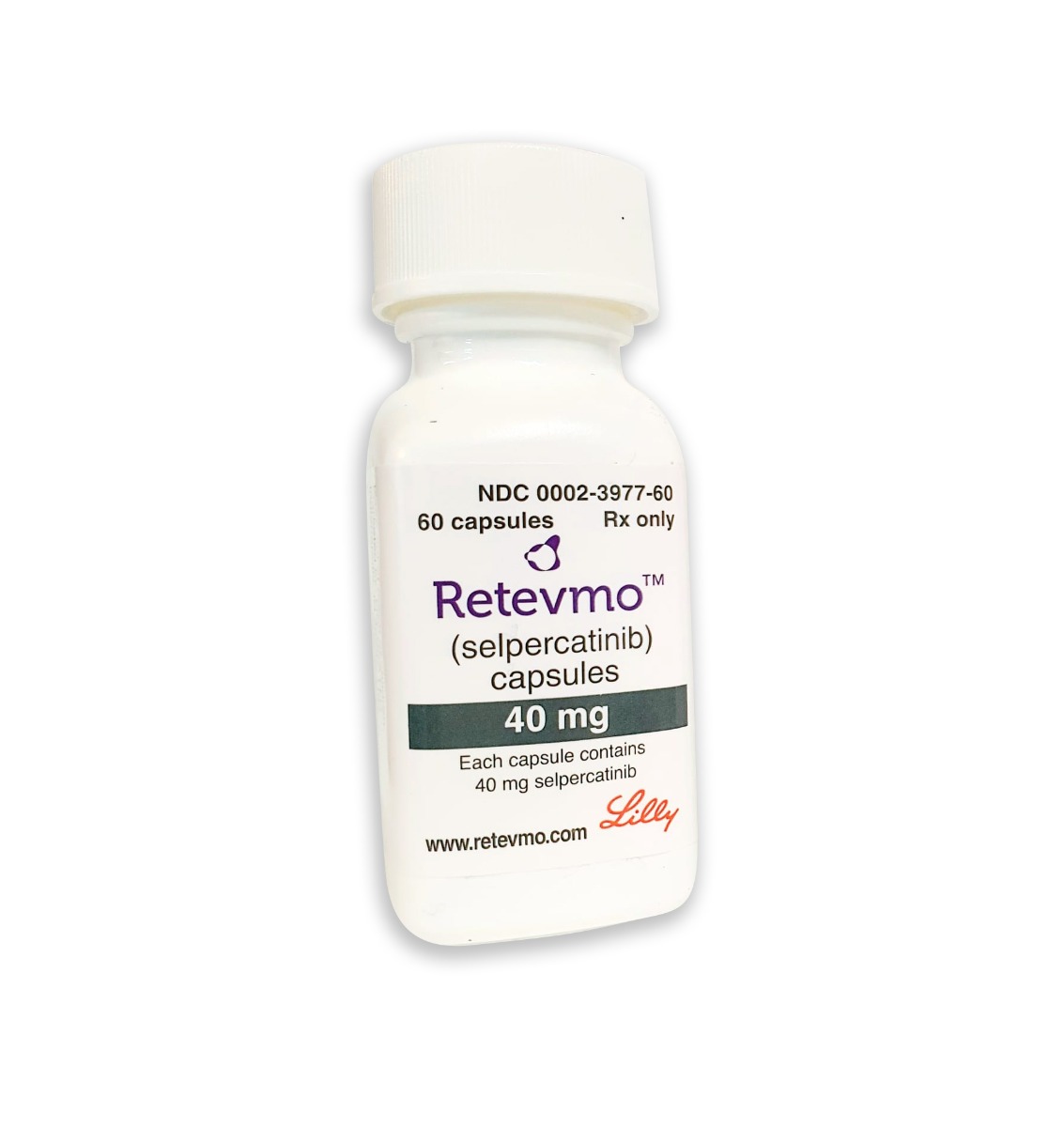Cometriq (cabozantinib) vs Retsevmo (selpercatinib)
Cometriq (cabozantinib) vs Retsevmo (selpercatinib)
Cometriq (cabozantinib) and Retsevmo (selpercatinib) are both targeted therapies used to treat certain types of cancer, but they are approved for different indications and work through different mechanisms of action. Cometriq is a tyrosine kinase inhibitor that primarily targets MET, VEGFR, and RET proteins and is used for the treatment of medullary thyroid cancer and advanced renal cell carcinoma. Retsevmo, on the other hand, is a selective RET kinase inhibitor specifically designed for cancers with RET alterations, including RET fusion-positive non-small cell lung cancer, RET-mutant medullary thyroid cancer, and advanced solid tumors with RET fusions. A healthcare provider would consider the specific type of cancer, the presence of certain genetic mutations, and the patient's overall health status when deciding between these two medications.
Difference between Cometriq and Retsevmo
| Metric | Cometriq (cabozantinib) | Retsevmo (selpercatinib) |
|---|---|---|
| Generic name | Cabozantinib | Selpercatinib |
| Indications | Medullary thyroid cancer, advanced renal cell carcinoma, and hepatocellular carcinoma | RET fusion-positive non-small cell lung cancer, RET-mutant medullary thyroid cancer, and RET fusion-positive thyroid cancer |
| Mechanism of action | Tyrosine kinase inhibitor that targets MET, VEGFR, and RET | Tyrosine kinase inhibitor that selectively targets RET alterations |
| Brand names | Cometriq, Cabometyx | Retsevmo |
| Administrative route | Oral | Oral |
| Side effects | Diarrhea, palmar-plantar erythrodysesthesia syndrome, decreased weight, decreased appetite, nausea, fatigue, oral pain, hair color changes, dysgeusia, hypertension, abdominal pain | Increased AST/ALT, increased glucose, decreased leukocytes, decreased albumin, decreased calcium, dry mouth, diarrhea, increased creatinine, hypertension, fatigue, edema, rash, pyrexia, constipation |
| Contraindications | Hypersensitivity to cabozantinib or any of its components | Hypersensitivity to selpercatinib or any of its components |
| Drug class | Tyrosine kinase inhibitor | Tyrosine kinase inhibitor |
| Manufacturer | Exelixis, Inc. | Eli Lilly and Company |
Efficacy
Cometriq (Cabozantinib) for Thyroid Cancer
Cometriq, known generically as cabozantinib, is a medication that has shown efficacy in the treatment of progressive, metastatic medullary thyroid cancer (MTC). Cabozantinib is a tyrosine kinase inhibitor that targets multiple receptors, which are involved in the pathogenesis of thyroid cancer, including RET, MET, and VEGFR. The efficacy of Cometriq in thyroid cancer was evaluated in a phase III clinical trial known as EXAM, which demonstrated that cabozantinib significantly improved progression-free survival compared to placebo. This improvement in progression-free survival indicates that Cometriq can delay the progression of thyroid cancer in patients with metastatic MTC, which is a rare form of thyroid cancer.
The EXAM trial showed that the median progression-free survival was 11.2 months for patients treated with Cometriq, compared to 4.0 months for those receiving placebo. This represents a substantial improvement and provides a treatment option for patients with few alternatives. However, it is important for patients and healthcare providers to consider the potential side effects and to monitor for adverse reactions during treatment with Cometriq.
Retsevmo (Selpercatinib) for Thyroid Cancer
Retsevmo, with the generic name selpercatinib, is another targeted therapy that has demonstrated efficacy in the treatment of certain types of thyroid cancers. Specifically, it is approved for the treatment of adult and pediatric patients 12 years of age and older with advanced or metastatic RET-mutant medullary thyroid cancer (MTC) who require systemic therapy. Selpercatinib is a selective RET kinase inhibitor, and its approval was based on the results of the LIBRETTO-001 trial, which showed significant antitumor activity in patients with RET-driven thyroid cancers.
In the LIBRETTO-001 trial, selpercatinib achieved an objective response rate (ORR) of 69% in patients with RET-mutant medullary thyroid cancer who had been previously treated with cabozantinib or vandetanib, two other kinase inhibitors. For treatment-naive patients, the ORR was 73%. These results indicate that Retsevmo is highly effective in shrinking tumors in a significant proportion of patients with RET-mutant MTC. As with any medication, the use of Retsevmo should be balanced with an awareness of potential side effects, and treatment should be managed by a healthcare provider experienced in the use of anticancer therapies.
Regulatory Agency Approvals
Cometriq
-
European Medical Agency (EMA), European Union

-
Food and Drug Administration (FDA), USA

Retsevmo
-
European Medical Agency (EMA), European Union

-
Food and Drug Administration (FDA), USA

Access Cometriq or Retsevmo today
If Cometriq or Retsevmo are not approved or available in your country (e.g. due to supply issues), you can access them via Everyone.org.
How it works

Make an enquiry
Choose the medicine you want to buy, answer a couple of questions, and upload your prescription to speed things up. We’ll get back to you within 24 hours.


Make an enquiry
Choose the medicine you want to buy, answer a couple of questions, and upload your prescription to speed things up. We’ll get back to you within 24 hours.


Breeze through the paperwork
We'll guide you through the required documents for importing unapproved medicine, ensuring you have all the necessary information.


Get a personalized quote
We’ll prepare a quote for you, including medicine costs and any shipping, administrative, or import fees that may apply.


Receive your medicine
Accept the quote and we’ll handle the rest - sourcing and safely delivering your medicine.

Some text on this page has been automatically generated. Speak to your physician before you start a new treatment or medication.
Let's talk
If you have any questions, call us or send us a message through WhatsApp or email:
Contact us




